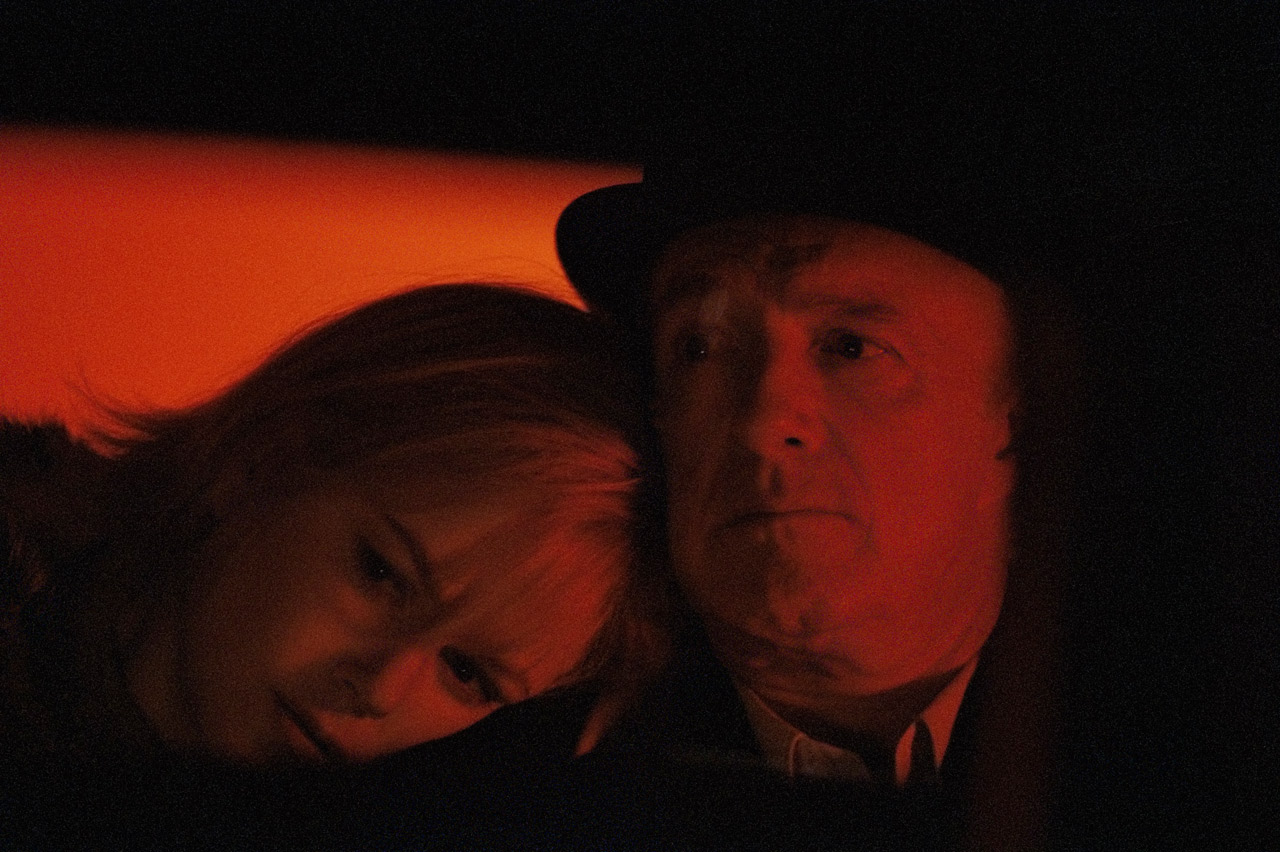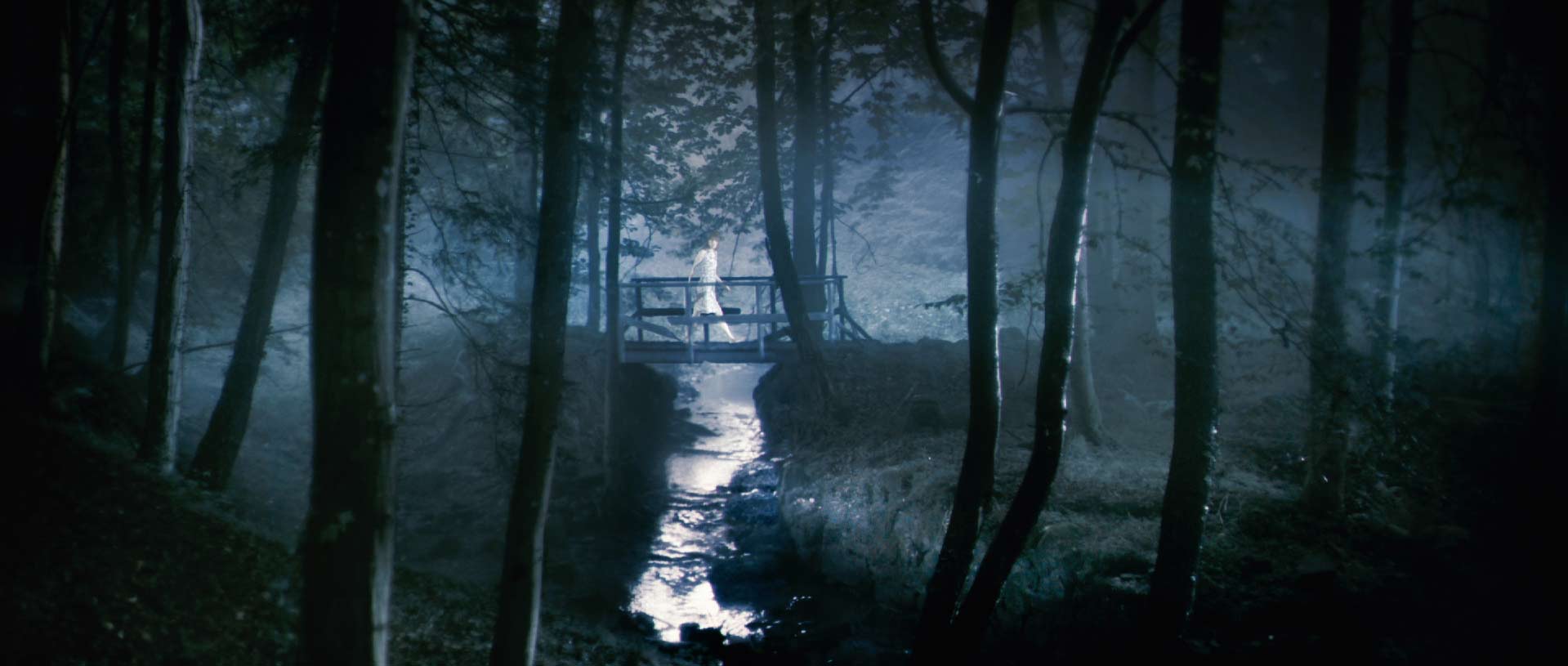Dogville
“You must know by now: there's a black floor, it takes three hours, nothing happens, the outcome is terrible. Nobody should say that they were not warned.” — Lars Von Trier
For a filmmaker who thrives on confrontation, Dogville is some kind of crowning achievement. In just under three hours’ time, Lars Von Trier’s latest provocation expertly draws audiences into, drags them through and spits them out the other side of a sad yarn from Hell’s own storybook. The unctuous narration by John Hurt offers a comforting introduction to the sleepy Rocky Mountain mining town named in the title. But as the story is told, his sing-song vocal stylings are revealed as utterly cynical and more than a little sarcastic. For his voice is also the voice of the auteur behind the film, and Von Trier takes a pretty dim view of Dogville.
[SPOILERS ENSUE. IF YOU HAVEN’T SEEN DOGVILLE, I HIGHLY RECOMMEND THAT YOU CHECK OUT MY CAPSULE REVIEW INCLUDED HERE INSTEAD.]
Get Dogville on Blu-ray from Amazon.comThing is, Von Trier probably isn’t crazy about Grace, the ironically named hero of his tale, either. Played by Nicole Kidman as the beautiful heir to a gangster fortune, she arrives in town on the run from her kingpin father, who’s furious with her over a difference in philosophies. At the urging of the town’s resident writer/philosopher, Tom (the consistently terrific Paul Bettany), the residents reluctantly agree to let her stick around, and eventually warm to her. But then they tire of her, and find her to be a convenient scapegoat for their own failings. And then the exploitation begins.
The film’s middle hour may be the hardest to sit through, as Grace is systematically broken down and humiliated. She’s raped, repeatedly (this development may not come as a surprise to anyone who’s seen Von Trier’s previous work), slandered and shackled. And she’s blamed for everything that’s wrong with Dogville. Her friend Tom shovels out some particularly reprehensible bullshit to cover his own misdeeds. It turns out that what really stings is that every man in town has gotten to fuck Grace except him – the only one who really loves her! And his desires reveal the corruption in his soul. “Wouldn’t it be worth compromising one of your ideals just a little to ease my pain?” he asks, with astonishing crassness. (That Tom is the creative/pretentious one in town adds extra sting to his hypocrisy; perhaps there’s something confessional on Von Trier’s part going on here.) The decision to stage the film on the barest of sets, with chalk marks on a blank floor representing walls and buildings, highlights the film’s narrative omniscience, which depicts the moral transparency of a town where everyone whispers privately about everyone else’s business.
For her part, Grace seems willing to be humbled. She handles degradation with impressive equanimity, refusing to blame her captors for behavior that she sees simply as human nature. But when Daddy rolls back into town in a conciliatory mood — she’s betrayed by Tom, whose ego is inflamed by the knowledge that every man in Dogville has had sex with her except he, the one who truly loves her — and gives her the opportunity to strike back, she debates the point with him for a few minutes before declaring, “If there’s any town this world would be better without, this is it.” And then she has every man, woman and child in Dogville shot dead. Just like that. It takes about 10 minutes, and it’s one of the most harrowing set pieces in recent film history — not because it’s horrifying, although it surely is that, but also because, for at least a few moments, it feels good. You go, girl.
The little Danish imp has been accused of conceiving Dogville as an anti-American tract, and there is a lot of evidence to support that assertion at first blush. He calls this film, together with the two that are slated to follow it, his “USA Trilogy.” Certainly his film nails a certain brand of provincialism and a suspicion of outsiders that are too common in the U.S., and Dogville itself has an Our Town feel that pegs it in the American tradition. (The townspeople even sing “America the Beautiful” at a holiday dinner, which is probably the most egregious example of America-baiting in the picture.) And then gangsters (!) show up, branding the film as a particularly American genre exercise. Speaking of genre, when Grace goes Old Testament on the little town, and given von Trier’s history with his female characters, Dogville plays like the ultimate rape-revenge flick — it’s as if the ghosts of Bess from Breaking the Waves and Selma from Dancer in the Dark are wandering through Dogville, too, having come to kick some serious fucking ass.)
Finally, as the credits roll, we see images of the lower class in America, shots of beaten-down men, women and children taken by Dorothea Lange and others, as David Bowie’s “Young Americans” blares underneath it all. (Even if you’ve kept your composure throughout the narrative, this simple and unexpected juxtaposition may be enough to ravage you completely.) All the references to American life seem pretty specific.
And yet, Von Trier has been a vocal critic of a new Danish government that has significantly tightened immigration laws in recent years. In 2002, as Dogville was being produced, he told an interviewer, “I think that the moral standing of a country can be measured by its attitude towards refugees.” Indeed, Dancer in the Dark was explicitly an immigrant’s melodrama, finding a heroine in poor blind Selma, railroaded straight to the gallows by a justice system that believes more in eye-for-an-eye punishment than it does in fairness or equality. So there’s likely more nuance to the politics of Dogville than meets the eye of bristly American observers. Variety’s Todd McCarthy famously missed the point of the film’s climax, which is that violence is no more justifiable for being made palatable by philosophical chicanery. (And horseshit is horseshit, whether it comes from the mouths of gangsters like Grace’s father or self-styled poets like Tom.)
When the smoke clears and the blood-red moon sets on what used to be the town of Dogville, the film’s lasting impression isn’t simply an anti-U.S. message, or even a rumination on how much it sucks to be human. Rather, this is a film that urges humane treatment of others, insisting that honesty and compassion must replace arrogance, righteousness and self-interest. It warns that we must take responsibility for our own actions, painful as any particular admission of weakness or moral failing may be. And, as it suggests the terrible influence of ingrained xenophobia and exclusionary social politics on the young Americans of any era, Dogville argues, persuasively, that you reap what you sow.
Posted by on March 21, 2024 9:09 PMGet Dogville on Blu-ray from Amazon.com




